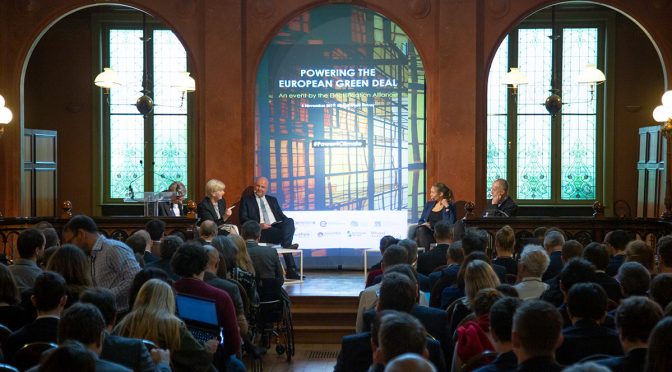A broad group of 100 organisations from major industrial sectors and civil society calls on EU policymakers to accelerate the uptake of clean and renewable electricity as the most cost-effective and energy efficient strategy to deliver a climate neutral Europe.
The European Commission’s Long Term Decarbonisation Strategy “A Clean Planet for All” showed that renewable and decarbonised electricity must increase significantly, replacing fossil fuels in Europe’s energy mix, as a precondition to meeting our climate and energy objectives.
Electrification has the potential to profoundly reshape Europe’s economy, revitalise its industry and ensure a clean and healthy environment for its citizens. It can drastically cut Europe’s €5bn per week bill for fuel imports, reduce energy consumption by 4-8 times and address the severe health risks associated with poor air quality.
To fulfil the vision of climate neutrality, necessary investments in network infrastructure, smart solutions and renewable energy generation must start now. Policies must be geared towards this objective.
The Declaration released today calls on EU policymakers to deliver a meaningful Green Deal and fast-track Europe’s electrification by:
- Mainstreaming clean and direct electrification in the heating, cooling and transport sectors (including heat pumps and electric vehicles), as the most cost-effective and energy efficient strategy to address climate change;
- Supporting a robust industrial strategy towards climate neutrality to ensure Europe’s leadership in renewables-based, decarbonised and digital electricity solutions including electrolysers;
- Ensuring that investments in energy networks, especially smart electricity grids, support the transition to a climate neutral economy;
- Modernising the energy taxation regime to accelerate the shift towards decarbonising electricity consumption and increased uptake of clean electricity in end-use sectors;
- Securing sufficient financing in the EU budget to support regions and Member States with a different starting point, including a meaningful Just Energy Transition Fund;
- Targeting Research and Innovation funding to accelerate a cost-effective transition in hard to abate sectors (e.g. cement, shipping, aviation), notably through an increase of the Horizon Europe budget to €120 bn.
Upon the release of the Declaration, Laurence Tubiana, CEO of the European Climate Foundation and co-architect of the Paris Agreement, said: “The Electrification Alliance is delivering a clear signal to European Union decision-makers that they should be confident in committing to net-zero carbon emissions by 2050. Electrification must be the dominant way forward in the clean energy transition – and European businesses are prepared to pave the way. This, hand in hand with the European Green Deal, is a unique opportunity to carve out the EU’s leadership on climate action and decarbonisation on the global stage”.
“Electrification is the most important solution to turn the vision of a fossil-free Europe into reality. We are determined to deliver, but we must be mindful of the different starting points and secure sufficient financing to ensure a fair transition”, said Magnus Hall, President of Eurelectric.
WindEurope CEO Giles Dickson said: “Zero-net carbon emissions by 2050 is technically and economically feasible. But only if we get renewables to supply the bulk of our energy demand. They’re one third of electricity today. But electricity is only 24% of our energy. We need to increase that. In particular we need to get more electricity into industrial processes, buildings and transport. They’re still largely powered by fossil fuels. Electrifying these parts of our economies would cut CO2 emissions and save money – because electric vehicles and heating are more energy efficient than fossil fuels.”


